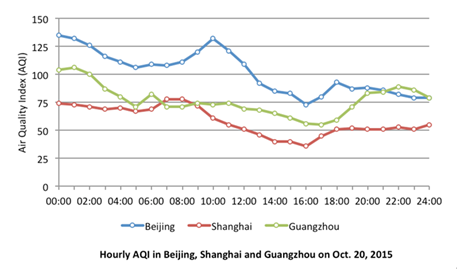为展示我校学生英语书面表达能力,进一步激发学生学习英语积极性,提高我校人才培养质量,经研究决定,丽水学院教务处举办2018年度“外研社杯”全国英语写作大赛浙江赛区丽水学院校园选拔赛。现将有关事项通知如下:
一、组织
主办:丽水学院教务处
承办:丽水学院民族学院英语系和大学英语教学部
二、参赛对象
我校全日制在校学生
三、竞赛赛程
大赛分为两个阶段进行:初赛和复赛
(一)初赛
参赛对象:报名选手
竞赛时间和地点:2018年5月24日晚上7:00—9:00,地点:待定
比赛环节:现场写作500字说明文和议论文各一篇(详情见附件一),竞赛期间不允许查阅任何参考资料或词典。
专业组晋级人数:8人
非专业组晋级人数:8人
(二)决赛
参赛对象:初赛晋级选手
竞赛实践和地点:2018年6月21日晚上7:00—9:00,地点:待定
比赛环节:现场写作500字说明文和记叙文各一篇(详情见附件一),竞赛期间不允许查阅任何参考资料或词典。
四、奖励设置
1.设英语专业和非英语专业一等奖各1名,二等奖各2名,三等奖各3名。
2、根据获奖选手综合素质推荐参加“外研社杯”浙江赛区写作比赛。
3、对于获奖学生,竞赛主办单位将颁发获奖证书,加分(参照其他学科竞赛加分规则)。
五、 报名时间、报名方式及咨询电话:
1. 报名时间:截至2018年5月24日
2. 报名方式:有意参赛者请将姓名、专业、班级、联系电话发到吴晓燕517750。
3. 咨询电话: 610603(罗小华),667593(杨玲)
附件一
2016年度丽水学院大学生英语写作竞赛样题
类型1 说明文写作(Expository Writing)
比赛内容:选手完成一篇说明文写作(500词左右)。侧重考查选手解说事物、阐明事理的能力,以及运用知识、观察理解、梳理分析、提炼总结、跨文化沟通的综合能力。
评分标准(总分100分):
Sample task 1
Write a passage based on the chart below. The chart shows the hourly AQI (Air Quality Index) in Beijing, Shanghai and Guangzhou on the same day. In your writing, you should summarize the information by selecting and reporting the main features and make comparisons where relevant. You should write at least 500 words but no more than 500 words.
Note
AQI | 0–50 | Good |
51–100 | Moderate | |
101–150 | Lightly polluted | |
151–200 | Moderately polluted | |
201–300 | Heavily polluted | |
>300 | Severely polluted |
类型2 议论文写作(Argumentative Writing)
比赛内容:选手完成一篇议论文写作(500词左右)。侧重考查选手的文献阅读理解、信息综合处理、判断分析、逻辑思辨、评价论述等能力,展示选手的知识广度、视野维度、思想深度等综合素质。
评分标准(总分100分):
Argumentative Writing | |
Content/Ideas (40%) | 1. Writing effectively addresses the topic and the task; 2. Writing presents an insightful position on the issue; 3. The position is strongly and substantially supported or argued. |
Organization/Development (30% ) | 1. Writing is well-organized and well-developed, using appropriate rhetorical devices (e.g. exemplifications, classification, analysis, comparison/ contrast, etc.) to support the thesis or to illustrate ideas; 2. Writing displays coherence, progression, consistency and unity; 3. Textual elements are well-connected through explicit logical and/or linguistic transitions. |
Language (30%) | 1. Spelling is accurate; 2. Writing displays consistent facility in use of language; 3. Writing demonstrates appropriate register, syntactic variety, and effective use of vocabulary. |
Sample task 2
Read the following paragraphs which present contradictory views. Write a passage about the issue, clearly stating your opinion and explaining your reasons. You should write about 500 words.
A poll conducted this year by zhaopin.com, a job-hunting service, reports that 6.3% of 2015 college graduates hope to start their own companies. This has almost doubled the figure for last year. Driven by this trend as well as encouraged by the Chinese government’s preferential policies for startups (创业公司), many college seniors are facing the dilemma as to whether to try to establish a business or to look for a job upon graduation.
Some people, mostly entrepreneurs-to-be, claim that with their passion, openness and creativity, as well as their knowledge, graduates can bring their potential into full play when building a startup. Others argue that new graduates, who have long been in the ivory tower of education, will find launching a business too difficult. Apart from finding the initial investment, operating a startup also requires the managerial experience and social connections which can only be gained through years of work in a mature enterprise.






